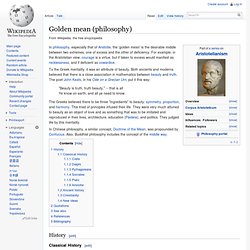

Deus ex machina. Contrived device to resolve the plot of a dramatic work Deus ex machina ( DAY-əs ex-MA(H)K-in-ə,[1] Latin: [ˈdɛ.ʊs ɛks ˈmaːkʰɪnaː]; plural: dei ex machina; English "god out of the machine")[2][3] is a plot device whereby a seemingly unsolvable problem in a story is suddenly and abruptly resolved by an unexpected and unlikely occurrence.[4][5] Its function is generally to resolve an otherwise irresolvable plot situation, to surprise the audience, to bring the tale to a happy ending, or act as a comedic device.[6] Origin of the expression[edit]

Deus ex machina. Philosophie pratique de Kant. Golden mean (philosophy) To the Greek mentality, it was an attribute of beauty.

Both ancients and moderns believed that there is a close association in mathematics between beauty and truth. The poet John Keats, in his Ode on a Grecian Urn, put it this way: 14 Untranslatable Words Shown In Incredibly Stunning Illustrations. The languages of the world are a beautiful thing.

Although most objects have direct translations into all different languages, many ideas and concepts are unique to the culture in which the language exists. Because of this, a word used frequently in one language might be completely alien to another, and require a sentence-long explanation. 10 Crazy Paradoxes That Will Blow Your Mind. A paradox is a premise that contradicts itself.

It’s a situation that seems to defy logic by producing an inconsistency that goes against common sense. Most logical paradoxes are known to be invalid arguments. However, they are still valuable for promoting critical thinking and sometimes proving a point by contradiction. Teasing your mind and question everything you think you know makes for great intellectual activity. Indeed, the closer you examine things, the more you’ll start to discover paradoxes all around you.